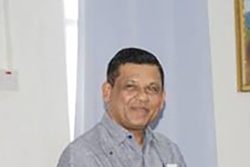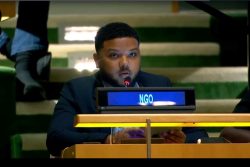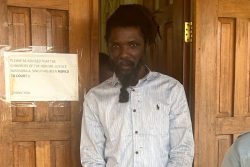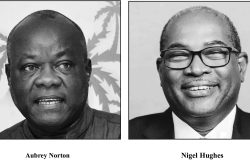By Miranda La Rose
The International Organisation for Migration (IOM) is expected to assist some 300 Guyanese deported from the USA in the reintegration process during the first year of its operations through financing of a micro-enterprises and skills training pilot project.
In an interview, Washington DC-based Regional Representative for North America and the Caribbean, Richard Scott told Stabroek News that the average number of those who would be given assistance was based on how many Guyanese had been deported annually in recent years. Scott was in Guyana last week to continue talks with the government, US embassy officials and civil society organizations. While provision is being made for those deported between this year and next year, no decision has been made to exclude those who were deported in previous years, he said.
The immediate objective of the IOM office, when established, would be to receive deportees at risk of having no jobs or a place to stay. However, the assumption is that persons returning to Guyana would have relatives with whom they can stay. In extreme cases where a person might have no place to stay owing to circumstances in which all connections had been severed, there is provision in the programme to provide limited accommodation.
The project has no objective of establishing a home for deportees, he said.
Scott, who was in the country along with Franz Celestine from the Washington DC IOM office said that in the implementation of the project, the IOM would be setting up an office in Georgetown to execute the programme which is being funded by the US government through the State Department.
In three months
“Perhaps within three months we will establish the IOM office here. However, before we do that we have to formally reach agreement with the government, which is expected sooner than later,” he said.
Apart from meetings with government officials which he said were encouraging, Scott said they held initial talks with representatives of the Institute of Private Enterprise Development (IPED) regarding training and assistance in the execution of the micro-enterprise projects.
The IOM’s experience elsewhere, he said, has been that the setting up of small businesses to provide gainful employment utilizes a significant portion of the funding, while training is the second option if persons want to seek alternative employment.
In general terms, he said, IPED expressed an interest in assisting in the execution of the project but added that all talks were in the preliminary stages. IPED has the experience in the management and operation of micro-enterprises and conducts training in this area, he noted, and there are also training opportunities being offered by other organizations. “We do not want to duplicate what already exists,” he explained.
Asked how much of the US$2.8 million earmarked for the pilot programme was earmarked for Guyana, as it also included Haiti, the Bahamas and Guyana, Scott said no figure has yet been determined but this would depend on the specificities of the programme. The project in Haiti began a year ago.
Based on what has been done in other countries, he said, the State Department has demonstrated some amount of flexibility in terms of funding if it was determined that the requirements were bigger than initially expected.
Stating that the reintegration project in Guyana could be related in some instances to the project in Haiti, Scott said that for 2007 to 2008, of the 1,000 Haitians who were deported, 850 opted to take part in the programme while the remainder chose to go their own way because they had the necessary family support.
Seven hundred and fifty deportees took part in the micro-enterprises project while the remaining 100 opted for skills training for employment with others or to become self-employed.
In the Haitian programme, he said, there was a component for language training since many of the deportees had left Haiti as children and had no knowledge of French or Creole. This he said would not be necessary in Guyana.
In addition, the IOM found in Haiti that there were serious problems of adjusting and some counselling was also needed, particularly for those who had left the country as children.
Asked about the progress of the project in Haiti to date, Scott said it was too early to speak about the micro-enterprises project but noted that many invested in internet cafes, which people use for making international calls. Some have also invested in bakeries and purified water stations.
He could not say what would prove to be fertile ground for investment in Guyana. “That area is left very much open,” he said.
The continuation of the reintegration project in Guyana, he said, would depend on the results of the first year and its effectiveness.
Asked whether there were any criteria for being involved in the programme, he said, “Only to have been sent back from the US and they must be interested in the programme.”
The IOM is an international organization with a membership of 123 states including Haiti, the Dominican Republic, Jamaica and the Bahamas in the Caribbean.
Representation
The resettlement programme follows representation Caricom Heads of Government made to the US government during the Conference of the Caribbean held in Washington DC in June 2006. Following the conference, a Caricom expert testified before the Sub-Committee on the Western Hemisphere in the US House Committee on Foreign Affairs.
At the hearing in July, 2007 Chairman of the Sub-committee on the Western Hemisphere, Eliot Engel had said he expected that the deportee reintegration programme would be an extension of the Haiti project which the US government hoped to set up “as a model to other Caricom nations.”
Nationals of the Bahamas, Haiti, Jamaica, Guyana and Trinidad and Tobago are among the highest sent back following crimes committed in the US. There has been a surge in criminal activities in the Caribbean and deportees, most of whom have little or no support, have been blamed for this.
At hearings before the Sub-Committee on the Western Hemisphere in the US House Committee on Foreign Affairs in July last year, it was noted that the United States had in detention at the time some 31,000 illegal immigrants and 66,000 foreign criminals, more than half of whom were in county jails awaiting deportation.
Over a decade ago, the US deported about 40,000 illegal immigrants annually and in 2006 the number had risen to 200,000 with some 300,000 breaching immigration laws.








